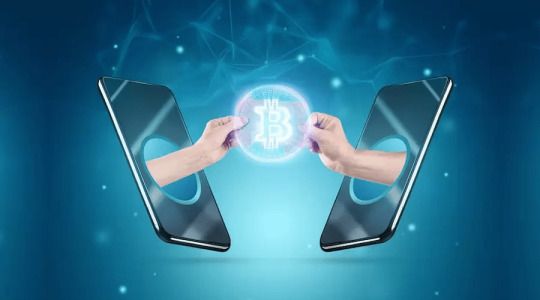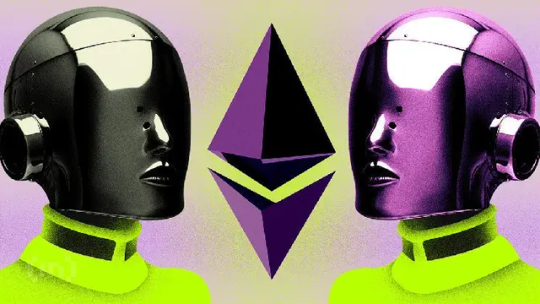#blockchainintegration
Text
Travala Opens More Gates to Solana and Offers SOL Incentives for Travel
Travala.com supports Solana, enabling users to pay for travel with SOL, USDT and USDC and earn up to 10% in travel rewards paid with...
#Web3Travel#CryptoAdoption#SolanaCommunity#TravelRevolution#TravelWithSol#CryptoInnovation#BlockchainIntegration#FutureOfTravel#TravelTech
0 notes
Text
#Blockchain#RetailTech#BlockchainInRetail#SupplyChainManagement#RetailInnovation#Cryptocurrency#BlockchainSolutions#RetailTechnology#SupplyChainTransparency#RetailBlockchain#DigitalLedger#BlockchainIntegration#RetailTransformation#SmartContracts#BlockchainApplications#RetailTrends#BlockchainUseCases#TechInRetail#DigitalRetail#RetailSecurity
0 notes
Text
Decentralised Compute: The Future of Cloud Computing

The future of cloud computing lies in the acceptance of decentralised Compute(computing).
We are all familiar with and frequently utilise “the cloud,” and in 2024, the majority of people will find themselves without it. Aside from their immediate demands, many of us neglect the wider picture when it comes to servers, storage, databases, networking, software, analytics, and intelligence, as well as the location of the data that has been collected about us.
Numerous industries rely heavily on cloud computing, which powers everything from small startups to large multinational corporations. Traditional, centralised cloud providers have dominated the market until recently, but innovative, decentralised approaches are quietly taking the lead in this area.
The purpose of the analysis that follows is to educate people who use these potent resources on a daily basis about the risks associated with centralised cloud computing and the advantages of decentralised cloud computing, which overcomes the drawbacks of centralised systems by offering fair and secure access to all.
Fair Access
“A system of government by the whole population or all the eligible members of a state, typically through elected representatives,” is what the dictionary calls “democracy.” Everyone is familiar with the word’s meaning. Reading the full term, however, makes the phrase “by the whole population” which defines democracy very evident.
Every member engages in the democratic process, contributes to decision-making, and reaps the rewards. Users benefit from the “by the whole population” mindset when decentralised compute power is used.
Decentralised compute providers make guarantee that power and data are not centralised in a few places or under the control of a small number of powerful companies by utilising a network of widely dispersed data centres. To continue with the metaphor, a monarchy would be comparable to those centralised sites and corporations in charge of affairs.
Instead, regardless of location or financial standing, the decentralised approach makes sure that resources are distributed throughout numerous data centre locations owned by various groups. When users are able to donate their unused gadgets for spare computing, full decentralisation will have been accomplished. But for now, the closest thing to decentralisation is this distributed architecture with multiple data centres throughout the globe.
Decentralised compute cloud providers level the playing field and encourage inclusivity by removing the obstacles provided by centralised control and providing smaller businesses and startups with the same high-performance computing capabilities as larger firms.
Flexibility and Scalability
The inherent scalability and flexibility of decentralised computational power is one of its main benefits. Decentralised networks share workloads among many smaller nodes, in contrast to centralised systems, which depend on a small number of very large data centres. With this distribution, tasks may be dynamically assigned to underutilised nodes, improving overall system performance and enabling more effective use of available resources.
Decentralised systems also have the ability to flexibly assign computing jobs in response to real-time demand, which results in more effective use of resources. On the other hand, centralised data centres frequently consume more energy because they operate at maximum capacity and with minimal consumption requirements regardless of real demand.
The modern world’s solution to the severe environmental problems caused by large, centralised corporations is decentralised cloud computing. By wisely utilising and sharing underutilised digital resources, it represents the future of a secure and equitable digital infrastructure that does far less harm to the environment, according to Matt Hawkins, founder of CUDOS, a blockchain network that combines blockchain and cloud technologies to provide global decentralised Compute power for users and developers.
Security and Integration with Blockchain
By integrating blockchain technology, decentralised Compute networks can prevent a single entity from monopolising resources and information. Blockchain is a dependable technique for these networks because of its inherent decentralised nature, which offers improved security, transparency, and durability.
Decentralised compute networks, which guarantee that no single entity can corner computing resources or information, are in perfect harmony with the spirit of Web3, which strives to create a more open and egalitarian internet. This alignment fosters innovation by providing developers and users with an inclusive and collaborative environment, while also improving security and transparency.
Payment Flexibility and Lower Transaction Costs
Furthermore, decentralised Compute firms frequently take bitcoin payments, improving user experience by offering adaptable payment methods. Because it enables users to utilise computer resources independently of traditional financial institutions, this feature is especially helpful for those who live in areas with limited access to traditional banking services.
The utilisation of cryptocurrencies in transactions can result in lower overhead expenses for both suppliers and users as compared to more conventional payment methods. Because of its cost-effectiveness, high-performance computing is now more widely available to a larger number of people at reduced costs for computer resources.
Advantages for Big Businesses
Big businesses frequently believe that the most scalable and dependable cloud providers are those that are centrally located. On the other hand, moving to Decentralised Compute networks offers other advantages including cheaper costs because of more effective resource usage and improved security thanks to blockchain integration.
Reasons for Small Businesses and Startups to Take Into Account Decentralised Cloud Computing
Decentralised compute networks provide small businesses and startups with an affordable, scalable option that may expand to meet their demands. These smaller organisations may compete more fairly with larger firms thanks to decentralised networks, which provide them access to high-performance computing resources without requiring a sizable upfront investment.
The way computing resources are accessed and used has changed significantly with the advent of decentralised compute power. In line with the decentralised principles of Web3, decentralised networks enable fair access to high-performance computing by providing scalable, adaptable, and safe solutions.
Investigating decentralised compute networks can be beneficial for both small and large businesses, since it can improve operational efficiency and spur innovation in the workplace.
Read more on Govindhtech.com
#decentralisedcompute#clouds#cloudcomputing#databases#networking#storage#software#BlockchainNetwork#blockchaintechnology#BlockchainIntegration#web3#computenetworks#news#technews#technology#technologynews#technologytrends#govindhtech
0 notes
Text
Last-Mile vs. Hub-to-Distributor: Decoding Healthcare Cold Chain Logistics with Cardinal Health, Envirotainer, FedEx & More!
Investment opportunities in healthcare cold chain logistics as of July 2024 | Comparison of Last-Mile Delivery and Hub-to-Distributor models, highlighting growth projections, emerging trends like blockchain integration and AI, and innovations
Healthcare Cold Chain Logistics: Last-Mile Delivery vs. Hub-to-Distributor – The Investment Opportunities
The healthcare cold chain logistics market is experiencing significant growth, driven by the increasing demand for temperature-sensitive pharmaceuticals, vaccines, and biologics. Within this market, two key delivery segments dominate: Last-Mile Delivery and Hubs-to-Distributor. As an…

View On WordPress
#BlockchainIntegration#ColdChainSolutions#Digitalization#HealthcareInnovation#HubtoDistributor#LastMileDelivery#LogisticsTechnology#MedicalLogistics#PharmaInvestment#PharmaLogistics#PharmaSupplyChain#SupplyChainManagement#TemperatureControlled#TemperatureMonitoring
0 notes
Text
What is the Coolest Application of Blockchain Technology?
Explore various applications of blockchain technology across different industries for improved efficiency and transparency.
Blockchain technology has been a buzzword recently and has reshaped how we manage data, security, and transparency throughout business operations.
From fintech to healthcare and logistics, blockchain adoption is rising. To scale in the digital landscape, you must hire blockchain developers for better blockchain development services.
This blog highlights the 9 coolest uses of blockchain technology, reflecting its versatility, and potential to transform business operations and information security.
What is Blockchain Technology?

Blockchain is a decentralized, immutable ledger system that records transactions across the network. It ensures transparency, security, and trust without the need for intermediaries.
Core benefits-
Enhanced security through cryptographic encryption.
Decentralization eliminates single points of failure.
Transparency and immutability foster trust in transactions.
Efficiency gains from automated and streamlined processes.
Cost reduction by eliminating intermediaries and administrative overhead.
Build scalable Blockchain solutions with a blockchain development agency.
Increasing Popularity for Blockchain in 2024
Today, users are more aware that blockchain benefits are one of the top drivers of this technology. The adoption of blockchain has improved transparency and also simplified business processes.
Also, the growing popularity of blockchain as a service and low-cost ownership has driven the global blockchain market. Most businesses adopt blockchain for smart contracts, payments, and digital assets, offering potential growth opportunities.
Top brands like Adobe, Allianz, Baidu, etc use Blockchain Technology.
Do you know?
The global Blockchain market is estimated to rise 58.90% CAGR from 2016 to 2024.
Almost 3 out of 10 Organizations in the baking sector have used blockchain technology.
India Has The Highest Blockchain Adoption Rates Worldwide
Start your blockchain app development with top blockchain developers. From finance to non-finance, every sector is adopting blockchain technology.
Let us explore different applications of blockchain technology across industries.
Applications of Blockchain Technology
Smart Contracts
Smart contracts are self-executing agreements with en-coded terms. They automate and enforce contract execution without intermediaries, simplifying legal and financial transactions. Blockchain keeps them secure and immutable for various applications, from insurance payments to real estate transactions.
These contracts are set to execute automatically when the predefined conditions are met, minimizing fraud. Many companies are adopting smart contracts in their legal operations to improve efficiency, reduce costs, and transparency. Choose Blockchain smart contract development services with us.
Healthcare
The healthcare industry is evolving and blockchain has been one of the factors driving its advancement. Today, the entire healthcare value chain can implement blockchain, from reducing costs to improving business operations and making information accessible across stakeholders.
Blockchain technology applications not only help healthcare organizations but also help patients and consumers.
It also contributes to extensive clinical trials to collect and secure patient data.
It helps verify whether a patient has insurance and is covered.
The blockchain platform facilitates continuous communication between patients and doctors, supported by a seamless flow of medical data. This ensures swift and secure diagnoses by any medical professional, leveraging comprehensive medical histories.
Hire the best blockchain developers and blockchain development company in India.
Blockchain and IoT
The Internet of Things (IoT) has transformed the way people connect devices and communicate. Today, IoT has exposed networks and devices for hackers to steal your data.
With Blockchain-infused IoT, you will get a second layer of security that safeguards user data ensuring transparency.
Blockchain allows secure and decentralized sharing of IoT data to improve data integrity and privacy.
IoT devices execute transactions autonomously using smart contracts on the blockchain for seamless supply chain management and device payments.
With Blockchain, you can verify IoT devices' identity to prevent unauthorized access and enforce trusted interactions.
Look for Blockchain consulting for better IoT integrations.
Blockchain Cybersecurity
Do you know Crypto Users Lost $1.8 Billion In 2023 To Hacks And Scams? With blockchain, you can help safeguard data to the greatest extent.
Blockchain stores data decentrally, making it harder for hackers to alter information and protect against DDoS attacks.
It enables secure and verifiable identity management, helping to prevent identity theft and unauthorized access.
Blockchain keeps transaction records transparent and unchangeable so you can track and audit any security breaches.
Logistics
The shipping industry struggles with poor communication and transparency because of the many logistics companies involved. As per Accenture and DHL, over 500,000 shipping companies in the U.S. lead to data silos and transparency issues, suggesting blockchain as a cost-efficient solution that `can address these problems to improve logistics and supply chain management.
Blockchain can build greater trust within the industry.
Blockchain can make the logistics process leaner and more automated, saving millions of costs.
Enables multi-tier visibility across supply chain systems to detect issues easily.
NFTs
Non-fungible tokens (NFTs) are one of the top blockchain applications. These can be any digital items, like music, art, GIFs, and videos, sold on a blockchain, ensuring that only a sole owner has full rights. Due to blockchain technology, users can claim ownership over their digital assets.
Blockchain ensures NFTs are authentic and unique, preventing fraud.
It provides a clear ownership record for NFTs, making it easy to track digital assets.
With Blockchain, creators can get automatic royalty payments when the NFTs are resold.
Government
Blockchain applications reduce the need for centralized government organizations but intensify the conflict between governments and cryptocurrencies. Governments recognize the potential of blockchain technology and are actively seeking ways to enhance operational processes using blockchain services. Many governments have already implemented blockchain for various purposes.
For example- Venezuela and Russia have launched their national cryptocurrencies to improve transparency and reduce corruption. Blockchain technology can create immutable voting systems, reducing fraud and fostering honest elections. It can improve identity management and tax administration for more reliable systems.
Social Media
Social media platforms have dominated our lives but come with potential issues like data breaches and poor user compensation. It's fair to say social media is losing its credibility.
Blockchain is set to transform social media by improving these platforms.
With its decentralized and distributed ledger structure, blockchain protects user’s personal information and potentially earns rewards from the content they select and share. Blockchain technology can significantly improve traditional social media.
Artificial Intelligence
Decentralizing AI can create Decentralized Autonomous Organizations (DAOs), businesses that operate independently using smart contracts, without centralized control.
An AI-powered DAO can learn from data and optimize itself more efficiently than human design. Combining blockchain and AI, or "decentralized AI," could revolutionize data security, monetization, and intelligent algorithms.
Blockchain applications are not limited to these industries mentioned above. Once you tap into a new industry, you will find scenarios for blockchain integration to improve and secure the process.
[Also Read- How Much Does Blockchain App Development Cost: A Detailed Overview]
Build Secure Blockchain Apps with OnGraph
In today's digital landscape, embracing decentralized technology like blockchain is essential. It's revolutionizing transactions, data management, and supply chains, enhancing security, traceability, and operational efficiency.
As a leading Blockchain Development Company in the USA, OnGraph provides a blockchain development team to deliver customized solutions for your Blockchain requirements. With our team of expert web app developers, we offer a range of services, from building secure decentralized applications (dApps) to seamless blockchain integration solutions.
#Blockchaintechnology#Decentralizedapplications#Smartcontracts#Blockchaindevelopment#Cryptocurrencyapplications#Blockchainsecurity#Blockchainplatforms#Blockchainforfinance#Blockchaininhealthcare#Blockchainforsupplychain#BlockchainforIoT#Enterpriseblockchain#Blockchainintegration#Publicblockchain#Privateblockchain
0 notes
Video
youtube
Interoperability & Multi-chain as a Service (S01E13)
#youtube#Interoperability#MultiChain#Blockchain#Cryptocurrency#Decentralized#SmartContracts#DistributedLedgerTechnology#CrossChain#DigitalAssets#BlockchainDevelopment#BlockchainIntegration#InteroperablePlatforms#BlockchainSolutions
0 notes
Text

Ever wondered how secure crypto payments are? Interested in learning more about the technology behind it?
Let's dive into the world of blockchain security: https://bit.ly/3HWLhRN
0 notes
Text
Exploring the Impact of Blockchain in Payments System

In the ever-evolving landscape of financial technology, one revolutionary force has been steadily gaining momentum — blockchain. This decentralized and distributed ledger technology has transcended its initial association with cryptocurrencies, making significant inroads into traditional financial systems. One area where its impact is particularly transformative is in the realm of payment systems. In this guest blog, we embark on a journey to unravel the profound implications of blockchain in shaping the future of payments.
Enhanced Security and Trust:
Blockchain, the underlying technology of cryptocurrencies like Bitcoin and Ethereum, is renowned for its robust security features. Utilizing cryptographic techniques, it ensures the integrity and immutability of transaction data. This inherent security reduces the risk of fraud and unauthorized access, fostering a heightened level of trust in payment transactions.
Real-Time Settlements:
Traditional payment systems often involve intermediaries and a labyrinth of processes, leading to delays in settlements. Blockchain eliminates the need for intermediaries by enabling peer-to-peer transactions. This not only expedites the settlement process but also minimizes the associated costs, making real-time payments a reality.
Global Accessibility:
Blockchain operates on a decentralized network, transcending geographical boundaries. This characteristic makes it particularly advantageous for international payments, where traditional systems can be plagued by inefficiencies, high costs, and extended processing times. Blockchain facilitates seamless cross-border transactions, empowering individuals and businesses with instant, cost-effective global payments.
Smart Contracts Revolutionize Agreements:
Smart contracts, self-executing contracts with the terms directly written into code, are a powerful feature of blockchain technology. In payments, smart contracts automate and enforce the terms of an agreement, streamlining processes such as invoice payments and reducing the need for intermediaries. This innovation holds the potential to reshape the way contracts are executed in the payment ecosystem.
Financial Inclusion:
Blockchain has the potential to bring financial services to the unbanked and underbanked populations. With its decentralized nature and accessibility through smartphones, blockchain-based payment systems can empower individuals who lack access to traditional banking infrastructure. This fosters financial inclusion, opening up economic opportunities for a broader spectrum of society.
Reduced Costs and Increased Efficiency:
By eliminating intermediaries, streamlining processes, and automating transactions, blockchain significantly reduces operational costs associated with payment systems. Financial institutions and businesses can achieve greater efficiency, allowing them to allocate resources more strategically and offer more competitive services to their customers.
Conclusion:
As we venture deeper into the digital age, the impact of blockchain on payment systems becomes increasingly evident. From heightened security and trust to real-time settlements and global accessibility, the transformative potential of blockchain is reshaping the way we perceive and conduct financial transactions. Embracing this technological revolution not only enhances efficiency but also paves the way for a more inclusive and interconnected financial ecosystem. The journey has just begun, and the future promises a payments landscape where blockchain plays a central and indispensable role.
For More Info Visit Here -> Blokchain In Payments System
0 notes
Text
Ethereum Smartphone: A Game-Changer in the Web3 World

In the fast-evolving realm of Web3 technology, the Ethereum smartphone has emerged as a true game-changer. Within a mere 24 hours, this innovative device, based on the Google Pixel 7a and fueled by the unique open-source operating system known as ethOS, managed to completely sell out its initial 50 units. Let's delve deeper into what makes this Ethereum smartphone a standout in the ever-competitive market.
The EthOS Operating System: Redefining Mobile Experiences
The "Ethereum Phone" derives its name from the Ethereum operating system, which goes by the abbreviation ethOS. Interestingly, 'ethOS' not only represents Ethereum but also carries the Greek connotation of 'character.' This double meaning encapsulates the uniqueness of this device, boasting an ethOS operating system designed to redefine mobile experiences.
One of the standout features of this smartphone is its built-in Ethereum light client. This specialized functionality transforms the device into a "light node" on the Ethereum network, enabling independent block validation. This unique capability sets it apart from other Web3 smartphones and enhances its performance in handling Ethereum-based transactions and smart contracts.
Seamless Integration: Payments, Messaging, and Ethereum Name Services
The Ethereum smartphone doesn't stop at Ethereum integration; it goes a step further by providing an array of built-in tools for effortless payment processing and seamless messaging. What sets it apart is its native integration with Ethereum Name Services (ENS), simplifying payment procedures for users. Additionally, it offers support for Ethereum Virtual Machines (EVM) and Layer 2 scaling networks, ensuring compatibility with a wide range of decentralized applications (DApps).
Exclusive Access Through NFTs

ethOS NFT. Source: OpenSea
Securing one of these coveted Ethereum smartphones required prospective buyers to obtain an ethOS non-fungible token (NFT) during the pre-sale period. Owning this NFT acted as a ticket to reserve their Ethereum smartphone. However, the process was not without its challenges, as fake NFTs flooded the market on OpenSea, the largest NFT trading platform.
For some enthusiasts, the cost of entry was steep, with ethOS NFTs commanding prices of up to three Ethereum (ETH), equating to nearly $5,000. This stands in stark contrast to the standard Google Pixel 7a, priced at a modest $499 in the US. The exclusivity and blockchain integration of these smartphones have driven their value skyward, with the price differential being a notable 10x.
Competition Heats Up in the Web3 Space
While the Ethereum smartphone made waves with its successful pre-sale, the Solana (SOL) smartphone faced a more challenging market entry. Records show that just over 2,000 units were sold since its release, according to Flipside records. To combat this, Solana Labs took drastic measures, reducing the price from $1,000 to $599, aiming to boost the appeal of their user-friendly crypto phone. This price adjustment came in response to the impending launch of the Ethereum smartphone, scheduled for the fall of 2023.
Conclusion
In conclusion, the Ethereum smartphone, powered by ethOS, is undeniably a trailblazer in the Web3 arena. Its innovative features, seamless integration with Ethereum's ecosystem, and exclusivity via NFTs have positioned it as a frontrunner in the competitive market. As the Web3 landscape continues to evolve, it will be fascinating to witness how this groundbreaking device shapes the future of mobile blockchain technology.
For more articles visit: Cryptotechnews24
Source: beincrypto.com
Related Posts
Read the full article
#blockchainintegration#CryptoNews#Ethereum#Ethereumintegration#EthereumNameServices#Ethereumsmartphone#EthereumVirtualMachines#ethOSoperatingsystem#NFTs#non-fungibletoken#OpenSea#Web3technology
0 notes
Text
#SmartContracts#BlockchainTechnology#BusinessAutomation#DecentralizedBusiness#SmartContractInnovation#BlockchainSolutions#AutomatingBusinessProcesses#SmartContractRevolution#DigitalContracts#BlockchainAdvancements#BusinessOnBlockchain#EfficientBusinessAutomation#DecentralizedTransactions#BlockchainInnovation#SmartContractEconomy#SecureBusinessProcesses#AutomatedContracts#BlockchainIntegration#TransparentBusinessProcesses#DecentralizedTech
0 notes
Text
#BlockchainIdentity#IdentityManagement#BlockchainTech#DigitalIdentity#BlockchainSecurity#DecentralizedIdentity#BlockchainInnovation#Cybersecurity#Fintech#BlockchainSolutions#IdentityVerification#TechNews#BlockchainAdoption#SmartContracts#DeFi#RegTech#BlockchainGrowth#DigitalTransformation#BlockchainIntegration#IdentityProtection
0 notes
Text
BST Coin, the groundbreaking digital currency that's revolutionizing the crypto market! 🌐 As the world's first real-world asset-backed native blockchain coin, BST Coin provides a seamless bridge between cryptocurrency and tangible assets. Join us in exploring the future of finance with BST Coin - where the power of blockchain meets the reliability of real-world assets! 🚀
📅 20-21 May 2024
📍 Dubai World Trade Centre
🏢 Booth #1
🌐 www.cryptoexpodubai.com
BSTCoin #BlockchainInnovation #RealWorldAssets #CryptoIntegration #AssetBackedCoin #DigitalCurrency #CryptoInnovation #CoinMarketCap #BlockchainTechnology #CryptoAssets #BSTBlockchain #CryptoEconomy #DecentralizedFinance #BlockchainRevolution #DigitalAssets #CryptocurrencyNews #FinancialInnovation #CryptoInvestment #BlockchainIntegration #CryptoMarket
0 notes
Text
Last-Mile vs. Hub-to-Distributor: Decoding Healthcare Cold Chain Logistics with Cardinal Health, Envirotainer, FedEx & More!
Investment opportunities in healthcare cold chain logistics as of July 2024 | Comparison of Last-Mile Delivery and Hub-to-Distributor models, highlighting growth projections, emerging trends like blockchain integration and AI, and innovations
Healthcare Cold Chain Logistics: Last-Mile Delivery vs. Hub-to-Distributor – The Investment Opportunities
The healthcare cold chain logistics market is experiencing significant growth, driven by the increasing demand for temperature-sensitive pharmaceuticals, vaccines, and biologics. Within this market, two key delivery segments dominate: Last-Mile Delivery and Hubs-to-Distributor. As an…

View On WordPress
#artificialintelligence#BlockchainIntegration#ColdChainLogistics#ColdChainSolutions#HealthcareColdChain#HealthcareInnovation#IoT#LastMileDelivery#LogisticsTechnology#MedicalLogistics#PharmaLogistics#PharmaSupplyChain#SupplyChainManagement#TemperatureMonitoring
0 notes
Text
Webcreatrz Technologies, a leading blockchain development company
We are a dynamic agency specializing in Web3 blockchain development expert with a proven track record of success across more than 80 projects, involving transactions totaling millions of dollars. My expertise encompasses the full spectrum of development, including:
✅Crafting exceptional websites
✅Customizing smart contracts
✅Conducting thorough audits
✅Launching projects, including PinkSale-like solutions
✅Implementing private and secure systems
✅Establishing whitelist protocols for effective access control
Developing advanced platforms using web3 technology
To get in touch and discuss your project, you can reach me on Skype WhatsApp
✅SkypeID- shivnilay.123
✅WhatsApp — https://lnkd.in/dndcehuM
✅website — https://webcreatrz.co.in
I’m excited to collaborate and take your project to the next level.
#Web3Development #BlockchainSolutions #SmartContractDev #DAppDevelopment #CryptoTechServices #DecentralizedApps #TokenizationServices #NFTDevelopment #BlockchainConsulting #EthereumDevelopment #SolidityDevelopment #CryptoAppDev #Web3Consultancy #BlockchainIntegration#DeFiDevelopment #CryptoTechExperts #BlockchainInnovation #BlockchainForBusiness #Web3Agency #CryptoDevServices
0 notes
Link
ICO or Initial Coin Offering is a mode of crowdfunding project in which the creators of the project sell ICO tokens to investors in exchange of money to start the project when the value of the sold tokens grows, the investors earn big time money! Intellibeans develop a business plan for ICO development service depending on the market research and where you get to know the fund to be raised and the initial fund required by the organization.
These are often used to fund the development of new cryptocurrencies. This is typically done to get funds without the need to go to a bank or any other places. An ICO launch service solves the basic problem of initial coin distribution. ICO also have an extra advantage, which is that they allow organizers to find a much wider option in their search for investment, and not to be limited to traditional financing.
ICO development service platform will provide a complete solution to earn more capable investors for your organization.
#ICODevelopmentServices#InitialCoinOffering#ICODevelopmentCompanies#BlockchainIntegration#WhitepaperBlockchain#Ethereum
0 notes
Photo

What if we integrate Odoo ERP with Blockchain technology?
- Establishing transparent P2P transcation
- Promoting dynamic efficient pricing
- Allowing micrometering
- Establishing a peputation system
- Enabling smart contracts
Consult with us: https://bit.ly/3lClyQW
#blockchain #blockchaintechnology #odooerp #odooerpsoftware #erpblockchain #blockchainintegrate #managementsoftware #software #OdooIntegration #Cryptocurrencies #Biometric #opensourceERP #erpsystem #erpsolution
0 notes